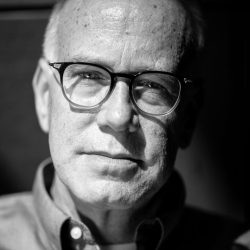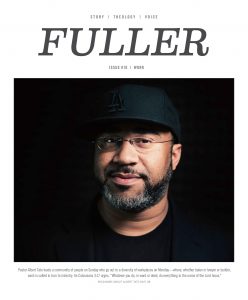
I recently met a young entrepreneur for coffee in a gentrified neighborhood of San Francisco. As we talked about the mission of Fuller’s Max De Pree Center for Leadership, he quickly cut to the chase. “I’m interested in this faith/work thing you’re talking about. I want to know how to do Jesus at work.”
“Doing Jesus at work” wasn’t always on the radar screens of Christians. Work was part of the “secular” world that had little to do with the “sacred” world of Jesus. Increasingly, though, followers of Jesus are rightly sensing that God’s world shouldn’t be divided up that way, and that work has everything to do with faith and faith with work.
In his book God at Work, David Miller locates us in “The Faith at Work Era.” His historical research examines the burgeoning conversation over the last 30 years about the integration of faith and work. This conversation began primarily among business practitioners, not scholars or pastors—and flourished mainly among upper-middle-class and upper-class white males. As you would expect, it reflected the longings and losses of this particular constituency. Personal fulfillment, ethical leadership, work- life balance, and workplace evangelism were common themes.
Increasingly, however, the conversation about faith, work, and economics is emerging among more diverse participants in more diverse communities. For example, the fact that Fuller Seminary is devoting a full theology section of FULLER magazine to work illustrates that “faith at work” is gaining interest among academics, several of whom have contributed articles to this issue.
Fuller’s De Pree Center seeks to include a broad range of partners in our conversations about faith, work, and economics. Not only does this diversity enrich our understanding and program, but it also encourages others to reach beyond their familiar constituencies. The articles in this edition of FULLER magazine reflect the breadth of topics and perspectives that come from a breadth of authors. In the typical discussions of the past faith at work era, you might not have heard about such things as justice, beauty, eschatology, breastfeeding, empathy, economics, and female entrepreneurship. But you will read about them here. And, as you do, you’ll be invited to think afresh about how your faith shapes your work and vice versa, and how, through your daily work, you are contributing to God’s work in the world.

Recientemente conocí a un joven empresario de café en un aco- modado barrio de San Francisco. Mientras hablábamos sobre la misión del Centro Max de Pree para el Liderazgo de Fuller, él rápidamente llegó al punto importante. “Estoy interesado en esta cosa de fe / trabajo de la que estás hablando. Quiero saber cómo hacer para involucrar Jesús en el trabajo.”
“Involucrar a Jesús en el trabajo” no está siempre en las pantallas de radar de los cristianos y cristianas. El trabajo fue parte del mundo “secular” que tenía poco que ver con el “sagrado” mundo de Jesús. Sin embargo, cada vez más, los seguidores y seguidoras de Jesús están sin- tiendo, con toda razón, que el mundo de Dios no debe ser dividido de esa manera, y que el trabajo tiene todo que ver con la fe y la fe con el trabajo.
En su libro Dios en el Trabajo (God at Work), David Miller nos ubica en “La Era de la Fe en el Trabajo.” Su investigación histórica examina la floreciente conversación en los últimos 30 años sobre la integración de la fe y el trabajo. Esta conversación comenzó principalmente entre los y las profesionales de los negocios, no eruditos o pastores, y floreció principalmente entre los varones blancos de clase media alta y de clase alta. Como lo puede imaginar, reflejaba los anhelos y las pérdidas de este grupo en particular. La realización personal, el liderazgo ético, el equilibrio entre la vida laboral y el evangelismo en el lugar de trabajo eran temas comunes.
Sin embargo, cada vez más, la conversación sobre la fe, el trabajo y la economía está surgiendo entre los y las participantes más diversos y en las comunidades más diversas.
Por ejemplo, el hecho de que el Seminario Fuller esté dedicando una sección completa de teología de la revista FULLER al trabajo, ilustra que “la fe en el trabajo” está ganando interés entre los académicos, varios de los cuales han contribuido artículos a este tema.
El centro De Pree de Fuller busca incluir una amplia gama de colaboradores y colaboradoras en nuestras conversaciones sobre la fe, el trabajo y la economía. Esta diversidad no sólo enriquece nuestro entendimiento y programa, sino que también alienta a otros y otras a llegar más allá de sus entornos familiares. Los artículos de esta edición de la revista FULLER reflejan la amplitud de temas y perspectivas que provienen de una amplitud de autores. En las discusiones típicas de la pasada era de la fe y el trabajo, usted pudo no haber escuchado hablar de cosas como la justicia, la belleza, la escatología, la lactancia materna, la empatía, la economía, y el em- prendimiento femenino. Pero leerá sobre esos temas aquí. Y, como podrá ver, será invitado e invitada a pensar de nuevo acerca de cómo su fe moldea su trabajo y viceversa, y cómo, a través de su trabajo diario, usted está contribuyendo a la obra de Dios en el mundo.

일저는 최근에 샌프란시스코의 어느 중상류화된 지역에서 젊은 사업가를 만나서 커피를 마셨습니다. 풀러 (Fuller)의 맥스 드 프리 (Max De Pree) 리더쉽 센터의 사명에 대해 이야기를 시작하자, 그는 재빨리 본론에 들어갔습니다.
“나는 당신이 말하고 있는 이 신앙 / 일에 관한 것에 관심이 있습니다. 직장에서, 예수님을 따르는 신앙의 삶을 어떻게 살 수 있는지 알고 싶습니다.”
“직장에서 예수님을 따르는 삶을 어떻게 살 수 있는지”는 항상 그리스도인들의 레이더 망에 있었던 것은 아니었습니다.
직장은 예수님의 “거룩한”세계와는 거의 관계가 없는 “세속적인”세상의 일부로 여겨졌습니다. 그러나 점차적으로 예수의 추종자들은, 하나님의 세계가 그렇게 이분화되어서는 안되며, 직장이라는 것은 신앙과, 또 신앙은 직장과, 전적으로 관계가 있다는 것을 당연히 감지하고 있습니다.
데이비드 밀러 (David Miller)는 직장에서의 하나님이라는 저서를 통해서, 우리가 “직장에서의 신앙의 시대 (Faith at Work Era)”에 살고 있다고 말합니다. 그의 역사적인 연구는 지난 30 년 동안 급발전해온, 믿음과 일의 통합에 대한 대화를 조사합니다. 이 대화는 주로 학자나 목회자가 아닌 비즈니스 실무자들 사이에서 시작되어, 주로 중상류층과 상류층 백인 남성들 사이에서 활발해졌습니다. 예상할 수 있는 것처럼, 그것은 특정 부류 사람들의 갈망과 상실을 반영했습니다. 개인적 성취, 윤리적 리더쉽, 일과 삶의 균형, 일터 복음 전도가 공통된 주제였습니다.
그러나점점더다양한지역사회의더욱다양한참여자들사이에서신앙,직장및경제에관한 대화가 점차로 부각되고 있습니다. 예를 들어, 풀러 신학교가 FULLER 잡지의 전체 신학 섹션을 직장에 초점을 맞추도록 했다는 사실은, “직장에서의 신앙”이 학계에서 관심을 얻고 있음을 보여주는 것입니다. 그 학자들 중 몇몇 사람들은 이 이슈에 대한 기사를 기고했습니다.
풀러 (Fuller)의 드 프리 센터 (De Pree Center)에서는 신앙, 직장 그리고 경제에 관한 대화에 폭넓은 동역자들을 포함하고자 합니다.
이러한 다양성은 우리의 이해와 프로그램을 풍성하게 할 뿐만 아니라, 다른 사람들이 그들과 친숙한 부류의 사람들을 초월해서 뻗어 나가도록 또한 격려해 주는 것입니다. FULLER 잡지의 이번 판에 실린 기사들은 폭넓은 저자들의 폭넓은 주제와 관점들을 반영합니다. 과거의 ‘직장에서의 신앙 시대”에 대한 전형적인 토론에서는, 여러분은 아마도 정의, 미(美), 종말론,모유수유,공감,경제,여성기업가정신에관한내용은들어본적이없을수도있습니다. 그러나 여기에서는 들어볼 수 있습니다. 그리고 들어보시면서, 어떻게 여러분의 신앙이 여러분의 직장을 형성하는지, 또 반대로 여러분의 직장이 어떻게 여러분의 신앙을 형성하는지, 그리고 이 세상에서 여러분이 매일 직장의 일을 통해서 어떻게 하나님의 역사에 공헌하고 있는지에 대해 새롭게 생각해 보도록 ` 초대받게 될 것입니다.


